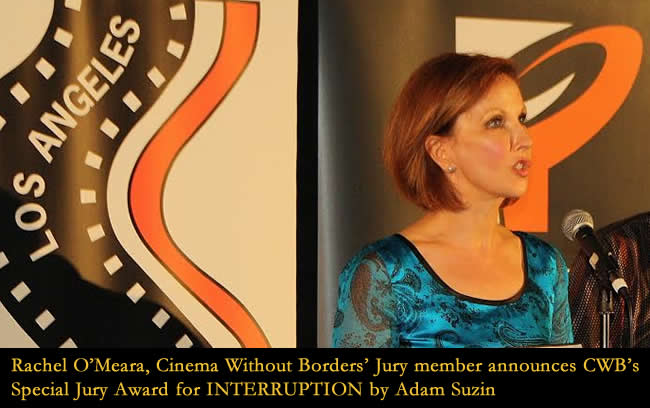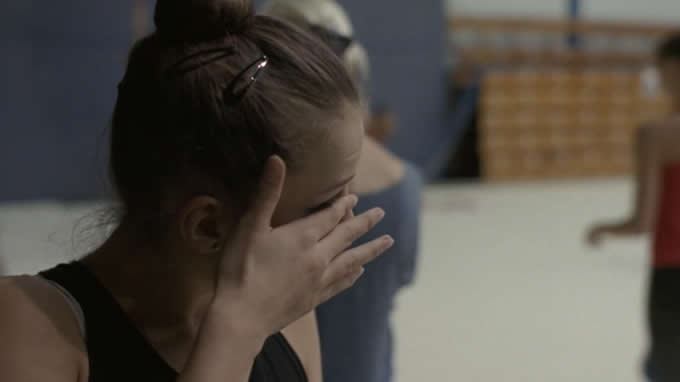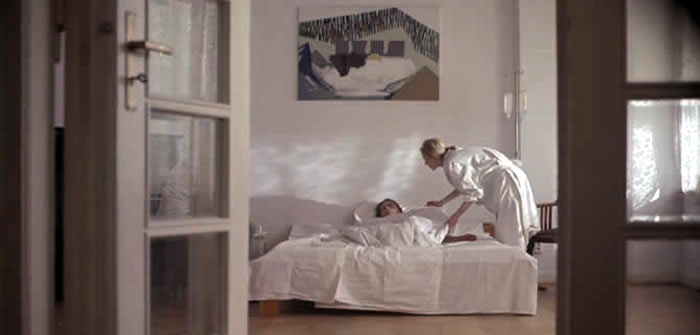 Polish short film INTERRUPTION shows when confronted to the hard situations in life, everyone tends to react differently. How we take it often depends on our physical endurance and our baggage of experiences. The film tells the story of a family, which during their normal day activity learns about some terrible news.
Polish short film INTERRUPTION shows when confronted to the hard situations in life, everyone tends to react differently. How we take it often depends on our physical endurance and our baggage of experiences. The film tells the story of a family, which during their normal day activity learns about some terrible news.
INTERRUPTION has won Cinema Without Borders Special Jury Award at the 2015 Polish Film Festival Los Angeles.
Adam Suzin, director, writer and cinematographer of INTERRUPTION was born in 1992 in Warsaw, Poland. A 3rd-year Cinematography student at The Lodz Film School. He participated in the ‘World from Down till Dusk’ workshops during which he shot documentaries in Georgia, Azerbaijan and India. His films were presented during numerous festivals in Poland and around the world.
Bijan Tehrani: How did you come up with the idea for INTERRUPTION?
Adam Suzin: This is my graduation film on IInd year of studies at The Polish National Film School in Łódź. We had to follow a guide line: the film must have no dialogue and only images tell the story. I wanted to make a film composed of three separate stories and somehow connect them. The subject of death is a taboo for me. I wondered how each of us reacts to a message about the death of a loved one, depending on the emotional baggage, or the situation in which we are at the moment. Nobody ever died in my family, so maybe it was an attempt to be prepared for such an event. Later came the realities in which characters live. When I was shooting a documentary about rhythmic gymnastics with a director, I wanted to make fiction about it. As a kid I was trained with acrobatics for 5 years, so I knew the bases of this sport and competition.
BT: It’s always very challenging to make a mood film with no story, how did you manage to keep the interest of the audience to the end?
AS: I think the editing of the film is a very engaging job. Kamil Grzybowski (the editor) and I were trying to keep the audience in tension, while they try to understand what these three stories have in common. We wanted to give them only small clues and solution is given at the very end. Additionally, each of these worlds is in it-self interesting (at least for me), whether it is – the world of boys riding on dirt track or the world rhythmic gymnastics, these worlds absorbs me.
BT: Dealing with a loss is always complicated and difficult Interruption shows this matter successfully, how did you write the screenplay for this short film?
AS: The script had one or two pages. They were just pure events without psychological analysis of the characters. The story isn’t based on my personal experience. It is an attempt to confront with this subject. From this position it was easier for me to think about it.
BT: How did you pick different characters of your film and their specific reaction to the loss?
AS: I wanted this reactions to be completely different. First idea for the film came from the picture I found on Internet where man is swimming in the river. I found it very emotional and I tried to imagine such a situation. Later came the competition and boy at the dirt park. I wanted to put those people in normal day activities, where we don’t expect anything and we’re absorbed with something. Sport is a great way to deal with stress and problems. It gives opportunity to get rid of bad emotions and forget about real life. I found the situation when the girl is making her routine after finding out about tragic message is an act of an extreme determination, which can have double meaning.
BT: How did you cast your film and how did you work with the actors.
AS: All the actors except the father were amateurs. Kinga Małaniuk is a real gymnast. Kinga played earlier in one school movie, which I liked. I knew that there must be a person who really is or was training to feel a truth of the world to which she belongs to. The gymnast was selected between the 2 girls. It was a matter of one rehearsal in which they both tried the last scene of the film and I knew she would be able to find herself in this situation. The work on the set was based on a conversation before shooting about the character. Most  work was about staging. The work on the set was specific because we shot on real gymnastics championships. Kinga has demonstrated extraordinary professionalism, in so heavy documentaries conditions. We repeated 3 times the routine on the board. All routines were held with the participation of the audience and other gymnasts. Because of the sound recording she could not perform with her music, so she was dancing without music in front of the cameraman that walked around her, with the whole gym filled with audience.
work was about staging. The work on the set was specific because we shot on real gymnastics championships. Kinga has demonstrated extraordinary professionalism, in so heavy documentaries conditions. We repeated 3 times the routine on the board. All routines were held with the participation of the audience and other gymnasts. Because of the sound recording she could not perform with her music, so she was dancing without music in front of the cameraman that walked around her, with the whole gym filled with audience.
I found the boy who was riding the bike quite by accident, when I was looking for locations for the film, riding on a bicycle through the woods I found of the dirt park. There I met riders including my character, but also the idea for the creation of the boy. Earlier we had him as a skater and the scene was planned on location of skate-park but as it turned out, these two extreme sports have a lot in common. The boy had to be an introvert kind of a person. Father (Przemysław Kozlowski) is a theater actor. I knew that it has to be a person who reaches deeper mental state, and therefore it couldn’t be an amateur.
BT: Please tell us about the visual style of your movie.
AS: The film is entirely shot with hand-held camera, except for one shot that shows mother on deathbed. It was shot on 35mm negative, which gives a great facture to the image that correspond with emotions.
It was important for me to be as close to characters and their emotions, that the camera follows the characters like in documentary films where you do not know what’s going to happen.
I knew that at the end of the film there would be slow-motion sequence, which will be a kind of visual poetry and will bond the three stories together.
My inspiration to the visual style came from Paranoid Park by Gus Van Sant.
BT: How do you feel about winning the Cinema Without Borders Special jury award for a Polish short film?
AS: I am very happy and surprised. It is rare that cinematographer’s film is awarded against so many great movies, so it is a great joy for me.
I would like to thank The Jury for the Award, and the whole team that was taking part in making this film and my parents.
BT: Do you think the Polish Film Festival Los Angeles will be successful in Promoting Polish cinema in the US?
AS: Festival brings major Polish productions as well as young thriving cinema to the US audience. I think that the Polish community living in the states has also the opportunity to see the Polish cinema at its highest artistic level. I hope it will bring a lot of Polish viewers to the cinema.
BT: What is your next project?
AS: I’m currently working with director Marta Prus on her graduation diploma film, where I’m a DP. I’m also working on a feature documentary film about the Russian rhythmic gymnastics (also by Marta Prus).

